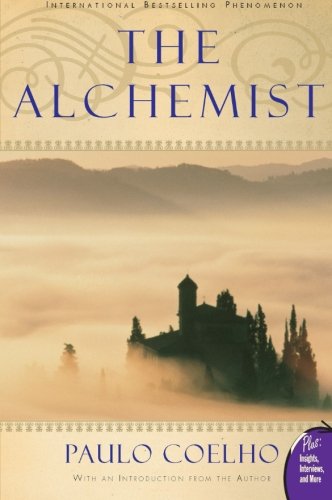
“My heart is afraid that it will have to suffer,” the boy told the alchemist one night as they looked up at the moonless sky.” Tell your heart that the fear of suffering is worse than the suffering itself. And that no heart has ever suffered when it goes in search of its dreams.”
The Alchemist is the magical story of Santiago, an Andalusian shepherd boy who yearns to travel in search of a worldly treasure as extravagant as any ever found. From his home in Spain he journeys to the markets of Tangiers and across the Egyptian desert to a fateful encounter with the alchemist.
The story of the treasures Santiago finds along the way teaches us, as only a few stories have done, about the essential wisdom of listening to our hearts, learning to read the omens strewn along life’s path, and, above all, following our dreams.
Every few decades a book is published that changes the lives of its readers forever. The Alchemist is such a book. With over a million and a half copies sold around the world, The Alchemist has already established itself as a modern classic, universally admired. Paulo Coelho’s charming fable, now available in English for the first time, will enchant and inspire an even wider audience of readers for generations to come.
Like the one-time bestseller Jonathan Livingston Seagull, The Alchemist presents a simple fable, based on simple truths and places it in a highly unique situation. And though we may sniff a bestselling formula, it is certainly not a new one: even the ancient tribal storytellers knew that this is the most successful method of entertaining an audience while slipping in a lesson or two. Brazilian storyteller Paulo Coehlo introduces Santiago, an Andalusian shepherd boy who one night dreams of a distant treasure in the Egyptian pyramids. And so he’s off: leaving Spain to literally follow his dream.
Along the way he meets many spiritual messengers, who come in unassuming forms such as a camel driver and a well-read Englishman. In one of the Englishman’s books, Santiago first learns about the alchemists–men who believed that if a metal were heated for many years, it would free itself of all its individual properties, and what was left would be the “Soul of the World.” Of course he does eventually meet an alchemist, and the ensuing student-teacher relationship clarifies much of the boy’s misguided agenda, while also emboldening him to stay true to his dreams. “My heart is afraid that it will have to suffer,” the boy confides to the alchemist one night as they look up at a moonless night.
“Tell your heart that the fear of suffering is worse than the suffering itself,” the alchemist replies. “And that no heart has ever suffered when it goes in search of its dreams, because every second of the search is a second’s encounter with God and with eternity.” –Gail Hudson
Product Features
- The Alchemist
- Paulo Coelho

All the Universe can be observed in a single grain of sand I checked this book out from the library, but I’m going to buy a copy and re-read it at regular intervals. I read it over the course of one day, thought “nice fable” & began reading another book as soon as I finished this one. But I found that the lessons contained in this simple story of a shepherd boy seeking treasure, won’t be dismissed so easily. They must have taken up residence in my subconscious and kicked up some dust, because my mind keeps returning to the lessons of the story to find new and more subtle insights having formed. These are lessons that we all know in our hearts, but that we forget as we get wrapped up in the hustle and bustle of our material lives. Lessons about listening to our hearts and following our dreams. Lessons about living in the moment, the transient nature of possessions and the illusion that we can even “possess” something to begin with. Lessons about freeing ourselves from fear and about…
Flawed But Ultimately Thought-Provoking and Worthwhile Yes, much of what negative reviewers of this book have to say is true: the writing is blunt and simple, the characters lack depth and complexity, it is quite male-focused in its subject matter and language, it has a bunch of quasi-religious mumbo-jumbo, and so on. This book should not be put on the list of great literature for the ages. There are doubtless many novels that cover subject matter from this book far more artfully. As I read the book, I was aware of its hokeyness and lack of redeeming literary qualities. I am, in fact, usually the first person to criticize books that read like this.